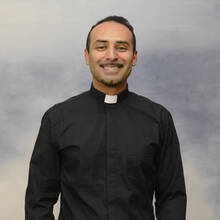God’s commands reveal a loving heart, not a rational mind
Jesus’ opponents are growing in numbers in this particular chapter of Matthew’s Gospel. While there were vast differences among the Herodians, Pharisees, Sadducees, and legal experts of the day, certain members of each group found something to dislike in Jesus’ message. They may have felt that Jesus’ synthesis of Israel’s ancient law challenged the soft power that they held in religious and political spheres. As Jesus developed his ministries of preaching and healing, he found ways to connect with the real lives of the people who came to hear him. This appeal to everyday experience gave his message an authority that his opponents lacked.
If he cries out to me, I will hear him; for I am compassionate. (Ex 22:26)
How does belief play a role in your behavior towards those who cry out to you?
How do your actions towards others affect what you believe?
Can you hear the cry of anyone calling out to God right now?
In this Sunday’s Gospel, a lawyer from the Pharisee faction tests Jesus. “Teacher, which commandment in the law is the greatest?” (Mt 22:36). It is not clear from the text whether this question is earnest or provocative. Jesus draws on different parts of Israel’s sacred tradition to remind this lawyer that the fulfillment of the Law and the prophets is to love God with all of one’s power and to love one’s neighbor as oneself.
To love God is to hear the cry of a neighbor, even a distant one, and respond.
The latter part of Jesus’ answer echoes the language of this Sunday’s first reading from Exodus. Speaking of Israel’s widows, orphans, and resident foreigners, God commands, “If ever you wrong them and they cry out to me, I will surely hear their cry” (Ex 22:22). In this way, biblical Law expanded the concept of “neighbor” to include the dispossessed and powerless. They were true Israelites, deserving of the same protection and benefits. Thus, explicit in this Sunday’s first reading and implicit in its Gospel is the warning that the powerless find their defender in God’s own person.
In my own parish, we have tried to model this in the prayers of the faithful. For the past two weeks these have included the following petition: “For the people of Israel and Gaza–that the care of the poor and the vulnerable, the care of those without sufficient food and water, become a focal point of discussions and a priority for the governing bodies.” The petition refuses to enter into justifications for warfare, but acknowledges that power is best expressed by focusing around the most vulnerable. Leaders in Israel and Palestine have the power to focus on the needs of the helpless even as they struggle to achieve their desired outcomes. This is, in fact, God’s will even in time of war.
To love God is to hear the cry of a neighbor, even a distant one, and respond. To neglect our neighbor is to love God with one’s mind but not with one’s life. Caring for the needy is an ancient precept of Judaism and Christianity. In every generation, there will be many who can explain rationally why such care is impossible, or even a waste of time or resources. God’s commands are not meant to be products of reason, however. They are rooted in the experience of real life and bear characteristics not of the head but of the heart: The answered cry for help, the protection of the vulnerable, the response of a loving voice.








